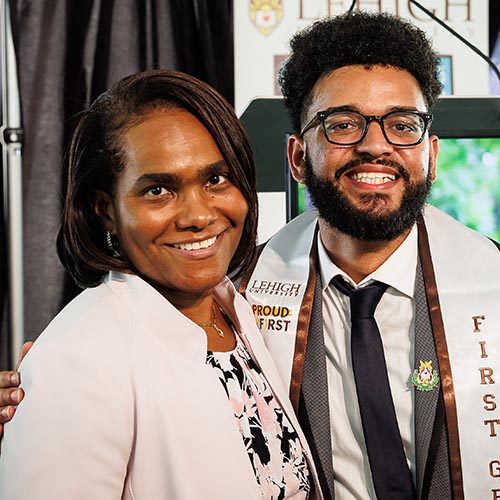Graduation is an amazing time to celebrate what students have accomplished. For first-generation students, that accomplishment is twice as nice, having achieved a feat that can transform their lives and a family for generations to come.
At the 2024 commencement, nearly 20% of the students were celebrated as first-generation graduates. Following the ceremony, these graduates and their families attended a celebratory luncheon.
Ginelle Julien ’94 ’96G ’28P spoke at that event as well as Luis Caceres ’24.
 Julien earned a Bachelor of Science in mathematics and then remained at Lehigh to earn a master’s degree in applied mathematics. She began her career at Accenture, worked as an entrepreneur with M/WBE Technology and Management Consulting Company, and then joined Johnson & Johnson where she is a senior vice president.
Julien earned a Bachelor of Science in mathematics and then remained at Lehigh to earn a master’s degree in applied mathematics. She began her career at Accenture, worked as an entrepreneur with M/WBE Technology and Management Consulting Company, and then joined Johnson & Johnson where she is a senior vice president.
Caceres earned a dual degree with a bachelor’s in biology and another in sociology and anthropology. He will be pursuing a master’s degree in public health at Lehigh in the fall with a focus on addressing health disparities in low-income communities.
Julien and Caceres met to discuss their first-generation journeys at Lehigh and how the accomplishment is tempered with challenge.
What was it like to be a first-generation student at Lehigh?
Luis Caceres (LC): I, like a lot of first-generation students, faced imposter syndrome. That feeling was made worse by the challenges all students encountered in the fall of 2020 as the COVID-19 pandemic moved classes online. It created two ways where I felt like I didn’t know what was going on. The Office of Diversity, Inclusion, and Equity helped me when I needed it most.
Ginelle Julien (GJ): I was new to the United States as I arrived in Bethlehem from Trinidad, so I was learning about a new culture as well as what it meant to be a college student. Over my head was the constant worry that one day I’d get the call telling me I had to come home, that my parents could no longer make it possible for me to be here. So I tried to plow through things as fast as possible to outpace that worry. I relied on my professors for mentoring and coaching.
Over time, I developed a set of unwritten rules that were designed to help me survive and thrive at Lehigh and beyond. For instance, most first-generation students can feel the need to hide by focusing on their studies, so I forced myself to get involved on campus. I had people teach me how to network. I worked to cultivate an image and then gain exposure with key people who would serve as champions for me, carrying my papers into rooms of opportunity.
As students of color, what made your first-generation journey more challenging at a predominantly white institution?
LC: There wasn’t a space on campus for Dominican students, so my friends and I created the Dominican Culture Club. It really blew up, and we formed connections with other Hispanics in the Bethlehem community and across the Lehigh Valley. So I have worked to find and make pockets on campus where I feel comfortable and supported.
GJ: There were 35 Black, Indigenous, and other people of color among the thousand students when I was on campus. When I set my tray down at a table in the cafeteria, that table would clear out. So I was forced to find spaces like the Umoja House and Black Student Union. Other groups of students who shared our small numbers, like the Pride Center, banded together to help each other. So we created community and intersectionality. The bonds were strong and close. Four classmates were in my wedding, and one is godmother to my child.
What did this accomplishment mean to your family?
GJ: My father told us over and over that others can take anything away from us, but they can’t take our education. He worked three jobs while I was in school. There were times when his shifts overlapped, and I wouldn’t see him for three days. That’s why education was important to my parents. They saw it as a way out of poverty. Education meant sacrifice. My sister still teases me that she ate soup and tuna for four years while I was in college.
That hard work and sacrifice puts an onus on first-generation students. We become the “chosen one” that carries a hidden burden, that we have to be perfect, that we have to press on no matter the circumstances, that we will shape the future for our family and our family’s family. It comes at a cost that we often don’t give ourselves the grace we need.
LC: I am the youngest of my siblings. The older two dropped out of college. During my sophomore year, I too had my form filled in, ready to drop out. I didn’t feel I could afford Lehigh. But I held on. I wanted to be the person to carry my family out of the struggle. Then I had a health scare, but I still pushed myself until I was forced to seek treatment. Being sick didn’t slow the array of responsibilities I had with classes, grades, and jobs. I felt like I might fall apart as I worked to hold my family up.
GJ: You become a rock. You tell yourself you can’t get sick. I used to tell people that I eat stress for breakfast. I saw my life and my success as their 401(k). So the symptoms I developed at Lehigh sat in the background until I needed emergency surgery. I then had to re-evaluate those moments and what matters most. I had to begin to give myself space for self-care.
Share a highlight from your time on campus.
GJ: I give all credit to Lehigh. It was the thing that prepared me for the world I live in now. I am resourceful. I learned that at Lehigh. Eric Salathe, professor emeritus, mathematics, made each student teach a class in his 300-level course. It made me realize that I need to find helpers and allies so I can be successful. It’s a lesson and attitude I carry with me.
LC: I tell people if I could go back and start over that I would still pick Lehigh. It is a unique place for its interdisciplinary approach. I felt supported to do more and be more. While I am pursuing a graduate degree, my path is still not clear, but I do feel clear that I can and will make an impact.


